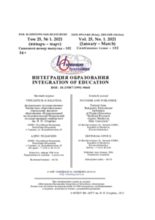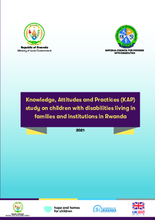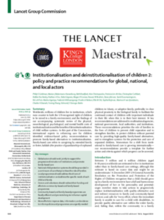Displaying 121 - 130 of 713
The study sought to reveal socio-psychological factors of successful integration of institutionalized adolescents into mainstream schools.
This study is part of the response to the global call for the provision of quality alternative family-based care and prevention of family separation for children with disabilities. The study is premised on the view that the knowledge, attitudes, and practices regarding the attributes assigned to, and the conceptualization of, children with disabilities in their families and communities, vis-à-vis institutional care for children with disabilities, are also crucial determinants of barriers/ enablers of full and meaningful integration of children with disabilities into community life in Rwanda.
This study used data from the Bucharest Early Intervention Project – a randomized controlled trial of foster care for children raised in psychosocially depriving institutions – to examine the associations of the caregiving environment with reward processing, executive functioning, and internalizing and externalizing psychopathology at ages 8, 12, and 16 years, and evaluated whether these associations change across development.
This presentation - delivered by Marinus van IJzendoorn at a 18 November 2020 meeting of the Evidence for Impact Working Group, a working group of the recently launched Transforming Children's Care Global Collaborative Platform - presents evidence of the harmful impacts of institutionalization on children, demonstrates some of the benefits of deinstitutionalization for getting children back on track, and raises questions about gap-year volunteers working in orphanages.
The present study examined the protective effect of the error-related-negativity (ERN) in a sample of children who experienced at least 3-years of stable, relatively enriched caregiving after being internationally-adopted as infants/toddlers from institutional-care.
This systematic review critically evaluated the evidence for a causal association between child maltreatment and impaired cognition in children under 12 years.
In this second part of the Lancet Group Commission on institutionalisation and deinstitutionalisation of children, international experts in reforming care for children identify evidence-based policy recommendations to promote family-based alternatives to institutionalisation.
In this commentary piece, Anne Longfield, Children’s Commissioner for England, explores the use of children's care homes in England and the need for improved supports to prevent placement in children's home and to provide for the needs of children and young people who are placed in these homes.
This Lancet Group Commission, published between The Lancet Child & Adolescent Health and The Lancet Psychiatry, advocates global reform of the care of separated children through the progressive replacement of institutional provision with safe and nurturing family-based care.
In this commentary piece, Aisha K Yousafzai - of the Department of Global Health and Population at the Harvard TH Chan School of Public Health and the and Department of Paediatrics and Child Health at Aga Khan University - notes that "the evidence presented [in the Lancet Group Commission on the institutionalisation and deinstitutionalisation of children] and their call to action to ensure abandoned children can thrive in family-based care environments rather than in institutions matters now more than ever as the global community addresses unprecedented challenges to ensure a generation of children are not left behind with respect to their survival, health, development, learning, and safety."



